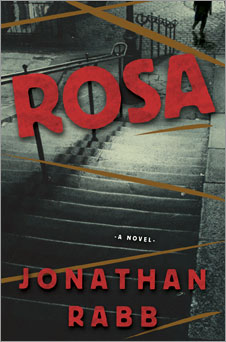Excerpt page 3
The men of the Kripo—known within police circles as Department IV—worked entirely out of the third floor, all four sides around the great courtyard given over to their offices, examination rooms, and archives. Hoffner’s office was along the back of the building, tucked safely away within the one spot that had managed to avoid the two-day battle for headquarters.
Stepping into the cramped space now, it was as if the first weeks of January had never taken place at all. Everything was as it had been, as it would be: open files littered the desk; bound casebooks, along with assorted editions of statutes and codes, stood in high columns along the bookshelves that ran the length of the far wall; two plaster casts of battered human skulls—evidence for upcoming court appearances—nestled between a stack of newspapers and two odd volumes of Brockhaus’s Konversations-Lexikon, for some reason Hoffner having taken a specific liking to the encyclopedia’s E and S installments; and, rounding it all out, a cup of something stale and cold—coffee was his best guess, but the color was wrong—sat at the center of his desk. Hoffner would have loved to have blamed his office on the revolution; he just couldn’t.
The one piece of perfect coherence in the room stretched the length of the wall across from his desk. It was a map of Berlin, clean, crisp, its few markings penned in a surprisingly neat hand. This was a custom with Hoffner: a new map for each new case. In that way he could allow the city to assert herself, fresh each time, her moods invariably the single most important clues to any crime. Each district had its own temper, a personality. It was simply his task to watch for the variations, find what did not belong, and allow those idiosyncrasies to guide him. Berlin called for deviation, not patterning. It was something so few in the Kripo understood. To his credit, young Hans Fichte was slowly not becoming one of them.
Hoffner stood in the doorway, as yet unable to see the incongruity in the four pins sticking out from the map: the Münz Strasse roadwork, the sewer entrance at Oranienburger Strasse, the Prenzlauer underpass, and the grotto off Bülowplatz. And now another in the Rosenthaler Platz station. There was something odd to that one—as he had known there would be—the feel of it forced as he drove the pin through the paper. He stared at it for nearly a minute before moving to the desk.
The place was still an icebox as he pulled his notebook from his pocket: someone had promised a delivery of coal by the end of the week, but Hoffner knew better. Picking up the cup on his desk, he sniffed at the contents and then took a sip: something to mask the brandy. With a wince, he swallowed and headed for the corridor.
The KD was behind his desk and on the phone when Hoffner pulled up and knocked at the open door. Kriminaldirektor Edmund Präger looked up and motioned Hoffner inside. Like his own appearance, Präger kept his large office sparse: a long wooden desk—phone, blotter, and lamp—with two filing cabinets at either end, and nothing more. More striking, though, was the absence of anything that might have indicated that a battle had been fought on these floors in the last week. Whatever remnants might still be in piles of debris around the rest of the offices, here there were none. Präger had insisted on it. If the revolution was over, it was over. He had no desire to be reminded of it.
Hoffner watched as Präger continued to nod into the receiver, an occasional “Yes, yes, of course,” or “Quite right,” poking its way into the conversation. Another half-minute and Präger again motioned to Hoffner. Not knowing what to do, Hoffner moved over to the window and gazed out, his eyes wandering across the wreckage in the square below.
Willingly or not, Hoffner now saw the Alex as if through a sheet of fine gauze, all of it familiar, real, yet profoundly not. In a single moment it had changed forever. Whether over hours, days, weeks, Hoffner had discovered that, in revolution, the passage of time is instantaneous, the reality of the sequence irrelevant and irrevocable: perspective made the sensation only more acute. He had felt something similar to this once before, the same distortion, the same jarring disbelief. Then, he had not thought himself capable of striking Martha—he wasn’t—and yet, in that one infinite moment, he had sent her to the ground, his oldest boy watching in horror, the reality of it now lost, only its shame lived over and over: one moment, all as it was, as it had been; the next, fine gauze, and with it a sense of helplessness so deep as to make it almost illusory.


